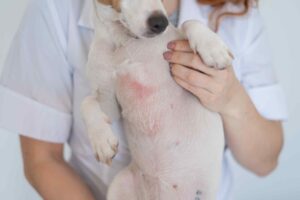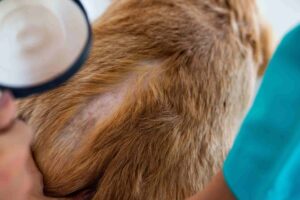Antibiotic resistance is an issue that affects not only human health, but also that of our animals. Therefore, new therapeutic strategies are also needed in veterinary settings in regard to both enteric and external infections.
In the case of pyoderma, a fairly common bacterial skin infection in dogs, standard treatment involves the application of shampoos and/or sprays with antiseptic or antibacterial active ingredients. However, similar activity is also being demonstrated by natural products from which the host could receive protection without incurring the increase in bacterial resistance.
For example, the use of a currant oil balsamic shampoo in cases of superficial pyoderma would appear to exert strong bactericidal activity against the Staphylococcus pseudintermedius, Staphylococcus aureus, Escherichia coli and Pseudomonas aeruginosa strains responsible for the disease.
This is the conclusion of the study coordinated by Antonio Corona of the Turin Veterinary Clinic, published in the journal Veterinaria .
In that study, researchers evaluated black currant seed oil (Currant Pet Shampoo Ultra®). After characterizing the skin bacterial profile of dogs with recurrent pyoderma, the 50 preeminent strains (10 Staphylococcus pseudintermedius (SP), 10 Staphylococcus aureus (SA), 10 Methicillin-resistant Staphylococcus pseudintermedius (MRSP), 10 Escherichia coli (EC) and 10 Pseudomonas aeruginosa (PA)) were isolated. These strains were incubated (24-48 hours) with different concentrations of the test extract (dilution from 1:2 to 1:256) to monitor bacterial growth demonstrating:
- bactericidal activity against all strains tested, including methicillin-resistant strains, up to and including 1:16 dilution; at lower concentrations, bacterial growth was inversely proportional and strain-related.
- Initial bacterial growth (0-10 CFU/ml) for strains of MRSP, 4 of P. aeruginosa, 2 S. pseudintermedius and 2 E. coli at the 1:34 dilution
- at the 1:64 growth dilution (11-20 CFU/ml) for 6 strains of S. pseudintermedius, 6 S. aureus, 4 for MRSP, P. aeruginosa and E. coli
- to the next of 1:128 growth (21-50 CFU/ml) instead for 4 strains of E. coli, 2 for MRSP, S. pseudintermedius, S. aureus and P. aeruginosa
- At the last dilution of 1:256 (> 100 CFU/ml) for only 2 strains of S. aureus
Despite initial promising results, the bactericidal activity of this formulation will need to be tested in vivo for confirmation of its efficacy in the clinic.







